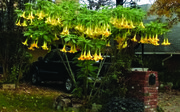Q I saw your article with the picture of the beautyberry bush. We have a native beautyberry bush behind our bird feeder. During the summer we see many birds, but never a robin. However, for the last two years in the fall a huge flock of robins has come through. They stay for a few days, and eat all the berries off the bush. Then they leave. We think this is strange. The other birds don't seem to care for the berries.
A According to the Audubon Society, the fruits of the beautyberry are eaten by a wide variety of birds, including robins, cardinals, wrens and many more. Maybe your robins are being bullies and keeping the other birds at bay.
Q I have a Chinese pistache tree that I planted about two years ago. It has been relatively slow growing. I planted it because it was reported to have outstanding fall foliage. So far all it has had is a pale orange. Is there something we can do to help it get more color next fall? I have been in awe of the beautiful red maples this fall in my neighborhood, so I am thinking of moving this tree and planting a maple. Is it realistic to try to move it, and when would be the best time?
A Chinese pistache trees normally have outstanding red fall foliage. Many of us were surprised that we had color as vibrant as we have had this fall. Our weather was not too conducive until mid-October. Good fall color usually occurs when we have warm days and cool nights, with ample moisture. Keeping your trees watered could help next year. As far as moving or planting new trees now, we are in a good season to do both. The dormant season -- November through February -- is the best time to transplant trees. The soil has some residual heat; we tend to get more rainfall; and the trees are dormant so they can spend their time putting out roots instead of supplying leaves with nutrition. If you think you can move the tree yourself, go for it. If it is too large, there are companies that use tree spades, which make the job much easier. To ensure the maple tree will give you the fall color you want, either find one at the nursery that still has its colorful fall leaves, or buy a cultivar such as "October Glory" or "Autumn Sunset," which should have good red fall color. Just because you buy a "red maple" does not guarantee it is the type that will put on the show you want.
Q Could you tell us the name of this tree or plant [photo at right]? And also where one can be bought.
A Wow! That is one stunning angel's trumpet -- Brugmansia species. These plants are becoming more and more popular. The other plant commonly called angel trumpet is Datura. Brugmansia plants were typically considered winter-hardy only in southern Arkansas for years, but are now surviving outdoors even in Northwest Arkansas with just a little extra mulch. They do die back to the ground after a killing frost, but they can grow up to 6 feet tall or more in one growing season, and they bloom in late summer to fall. Flower colors range from yellow and pink and a pale orange. Some gardeners want larger plants and earlier blooms, so they keep them in containers and move the pots inside for the winter. This allows the plants to begin growing from the top, not the soil line. They are often available at Arkansas Master Gardeners plant sales in the spring since they make a good "pass-along" plant. Some nurseries also carry them among their tropical plants.
Q I saw this plant [not shown] in Kentucky last week that was really pretty for this late in the year. Any idea what it might be?
A Believe it or not, it is an ornamental pepper plant. I would guess the variety to be "Black Pearl." Peppers will tolerate some light freezes, but will be gone once we have a killing frost.
Janet B. Carson is a horticulture specialist for the University of Arkansas Cooperative Extension Service. Write to her at 2301 S. University Ave., Little Rock, Ark. 72204 or email her at
jcarson@arkansasonline.com
HomeStyle on 12/02/2017

